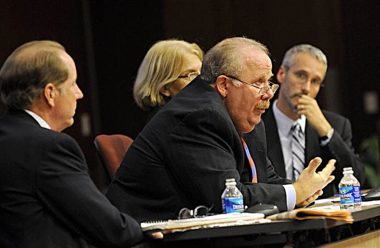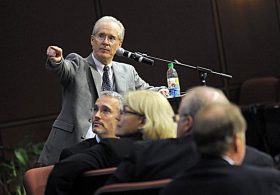The financial crisis that placed Wall Street on a daily roller coaster has several causes, and on Oct. 15, four economic panelists offered their thoughts about recent market turmoil to a room of students, faculty and staff from the Martha and Spencer Love School of Business.

1.) Steve DeLoach, a professor of economics at Elon
2.) Chris Baker, executive-in-residence in finance, former CFO of Capital Bank, and Elon Trustee
3.) John Slayton, CEO and president, The Trust Company Bank
4.) Kevin Kelly, former analyst and trader for Bear Stearns and an originator of credit derivatives and member of the Chandler Family Center for Professional Sales Center board of advisors.
“What we’re here to help you with is understand why your Roth IRAs and your 401(b)’s have felt a lot of pain,” Pavlik told the audience as he opened the discussion.
The factors that played into the current financial and, by extension, economic woes are many, from federal legislation that deregulated the investment banking industry, to the demand for mortgages when interest rates reached record lows.
The discussion, inside the LaRose Digital Theater in the Koury Business Center, came on the same day the Dow Jones Industrial Average closed more than 700 points down. The discussion was sponsored by Phi Beta Kappa and co-hosted by the William Garrard Reed Finance Center and the student chapter of the Financial Management Association.
“Happy families are all alike,” DeLoach said, citing an analogy previously used to describe general economic conditions. “But unhappy families are unhappy for various reasons.” He cautioned that people should not assume previous solutions to crises elsewhere would help America – and the world – climb out of its market slump.
As deregulation increased the competition among financial institutions, banks started looking for new investments to offer their customers, including credit derivatives and mortgage-backed securities. But when the Federal Reserve started raising interest rates again, homeowners who took out subprime mortgages started defaulting on their loans.
That rippled throughout the market. Coupled with an increase in housing supplies – more homes sitting on the market than there was a demand from customers – home prices slipped, leaving many thousands of people owing more on their properties than the market believed they were worth. The result was a spike in foreclosures.

Kelly said he believes the worst of the financial crisis has passed and that it may not be long before the markets stabilize. What is important, all the panelists said, was that housing prices stop their decline.
“There’s plenty of blame to go around for what happened here,” Kelly said.


